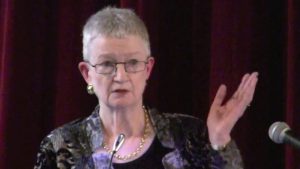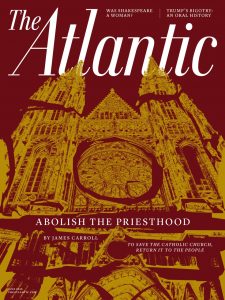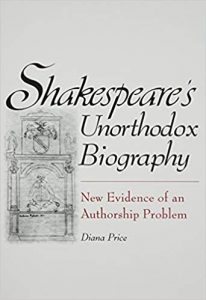
[Republished from Diana Price’s website with her kind permission.]
In its June 2019 issue, the Atlantic published Elizabeth Winkler’s article describing the case for a relatively recent candidate for Shakespeare’s authorship: Emilia Bassano. Bassano was mistress to Henry Carey, Lord Hunsdon; she was described in Simon Forman’s notes as ”somewhat brave in youth“ (an entry that A.L. Rowse misread as ”brown in youth“ and therefore prompted his nomination of Bassano as Shakespeare’s Dark Lady); she subsequently married Alphonso Lanier, a court musician. In the course of her article, Ms. Winkler favorably cited my research. The Atlantic recruited some reactions, mostly criticism from orthodox scholars but also constructive words from Sir Mark Rylance, an authorship skeptic. These responses were duly published (click here).
Ms. Winkler’s article was promptly attacked by Oliver Kamm at the Quillette blog and Dominic Green at The Spectator USA. Since Ms. Winkler cited my research explicitly, and since Mr. Kamm dismissed my research out-of-hand, I submitted a response to the editor at Atlantic. And I assumed that the usual courtesy would be extended: when an author’s work is explicitly cited and then criticized, the author has a right of response to defend his or her work.
Not in this case. I submitted my response to the Atlantic, which did not publish it. I subsequently submitted my response to Quillette, which did not publish it. It is possible that neither publication considered my response as meeting their editorial standards. Or it may be that orthodox gatekeepers influenced the editors’ decisions to not publish. We’ll never know. And yet, since I was criticized by name, I would have thought that at the least, the editors would have accepted my response, perhaps with qualifications or requests for changes, e.g., cut the length, revise this or that, and so on. (I would have considered forwarding my response to the SHAKSPER listserve moderated by Prof. Hardy Cook, but as a matter of policy, the authorship question is taboo on that forum.)
For the record, below is the response as I submitted it to Quillette:
”Was Shakespeare A Woman?“ A good question – or just plain nuts?

With the publication of her article in the June issue of the Atlantic (”Was Shakespeare A Woman?“), Elizabeth Winkler has stirred up a hornet’s nest. Well, good. The Shakespeare Authorship Question should be a legitimate question, and she opens the door for renewed skepticism. However, she’ll need a thick skin.
Oliver Kamm has hostile words for Ms. Winkler’s article. In his review (”Conspiracism at the Atlantic“), published at Quillette, he criticizes the Shakespeare Authorship Question in general, and the case for Emilia Bassano in particular. Ms. Winkler’s arguments concerning the case for Bassano are circumstantial yet provocative enough to merit further inquiry. Ms. Winkler cites my research on the authorship question with a link to my book, Shakespeare’s Unorthodox Biography; Mr. Kamm did not have anything good to say about my research, either. While I am not qualified to support or challenge Ms. Winkler’s case for Emilia Bassano, I am in a position to respond to the underlying question: is there a legitimate Shakespeare authorship question?
Mr. Kamm employs a word that itself betrays an inherent bias; he describes anti-Stratfordians as ”denialists.“ This is hardly a new accusation. In 2013, when Prof. Stanley Wells referred to me as someone who would deny the documentary evidence for Shakespeare’s life, I responded by stating that I do not deny any of the evidence; instead, I re-evaluate it. It is the re-evaluation of evidence that leads a skeptic to raise serious questions about the man from Stratford, the man who we all thought was a poet and playwright.
I do not argue for or against any alternative candidate, including Emilia Bassano. The candidacies of Bassano, Bacon, Oxford, and many others are circumstantial cases competing against the case for Shakespeare. But I do argue that there is good reason to question the traditional biography of the man from Stratford. Shakespeare left behind no personal papers or other evidence that allow biographers to trace his professional literary career. For reference, I use the term ”personal literary paper trail“ to describe evidence that can support one simple statement: his vocation was writing.
 After comparing the evidence for Shakespeare with that for two dozen of his contemporaries, I conclude that Shakespeare is the only alleged writer of any consequence from the time period who left behind no personal literary paper trails during his lifetime; it is a unique deficiency. Surprisingly, Prof. Stanley Wells acknowledges that deficiency. However, he also asserts that this deficiency does not matter, since in his view, posthumous testimony is just as reliable as contemporaneous literary paper trails.
After comparing the evidence for Shakespeare with that for two dozen of his contemporaries, I conclude that Shakespeare is the only alleged writer of any consequence from the time period who left behind no personal literary paper trails during his lifetime; it is a unique deficiency. Surprisingly, Prof. Stanley Wells acknowledges that deficiency. However, he also asserts that this deficiency does not matter, since in his view, posthumous testimony is just as reliable as contemporaneous literary paper trails.
If Shakespeare was the dramatist the title-pages claim him to be, then he was, by definition, a writer, and there should be some evidence to support that professional activity. Yet out of 70+ documents left behind during his lifetime, none support his alleged literary activities. So his name could be on all those title-pages for another reason, and no conspiracy theory is necessary to explain why.
The Shakespeare that I find in the documentary evidence is a businessman, investor, and entrepreneur. His theatrical shareholding puts him in proximity to the plays attributed to Shakespeare. He is named prominently in the theatrical documentation for the Lord Chamberlain’s, later the King’s Men. However, shareholders named prominently in documentation for other acting companies were invariably the business agents who were men of means, with sufficient capital to act as financiers – trading in costumes, properties, and . . . playbooks. And if Shakespeare traded in playbooks, then we are closer to an explanation as to why his name appears on title-pages of works he did not write, such as the play A Yorkshire Tragedy and others in what’s been dubbed The Shakespeare Apocrypha.
As for Alan Nelson’s assertion that I cannot make a decent argument, I invite any interested reader to take a look at our debate, which has been up on my website ever since my book was first published in hardcover. In his book Contested Will, James Shapiro’s claims and challenges to the fundamentals of the authorship question are either unsupported assertions or are based on untested underlying assumptions. One such assumption concerns the 1623 First Folio front matter, which is the first testimony on record to identify the actor as the playwright. However, in order to take the cumulative testimony at face value, one must ignore questions about the authorship of some of that front matter, exaggerations and advertising hype, as well as ambiguities that suggest two sets of sign-posts, pointing in opposite directions. (The First Folio refers to the first collection of Shakespeare’s plays, published seven years after his death in Stratford).
I have no idea who wrote the works attributed to Shakespeare, but I would hope that the day will come when it will be a legitimate question. There is not much in the known life of Shakespeare that can illuminate the plays and poems, and an author whose life does provide a few keys that can unlock some of the mysteries and unanswered questions about the plays would be exciting.
As a postscript, Richard Paul Roe’s 2011 book, The Shakespeare Guide to Italy, is filled with discoveries of the playwright’s first-hand knowledge of Italy, In other words, Mr. Roe proves that the playwright, whoever he (or she) was, had sojourned in particular parts of Italy. Shakespeare of Stratford, as far as we know, never set foot out of England.
Shakespeare’s biography should be based on something more than just circumstantial evidence. It is unfortunate that Mr. Kamm (as well as Dominic Green at The Spectator USA) have nothing but contempt for anyone who raises questions about a literary biography unsupported by a single personal literary paper trail.
###
Diana Price is the author of Shakespeare’s Unorthodox Biography: New Evidence of An Authorship Problem (paperback edition 2013). The book was first released in 2001 as no. 94 in Greenwood Press’s academic series, ”Contributions in Drama and Theatre Studies,“ making it the first book on the subject to be published in a peer-reviewed series. The updated paperback edition was published in 2013. Mr. Kamm claims that ”Price is neither meticulous nor a scholar.“ Price’s research has passed peer-review in several journals. Full bibliography is at her website.


